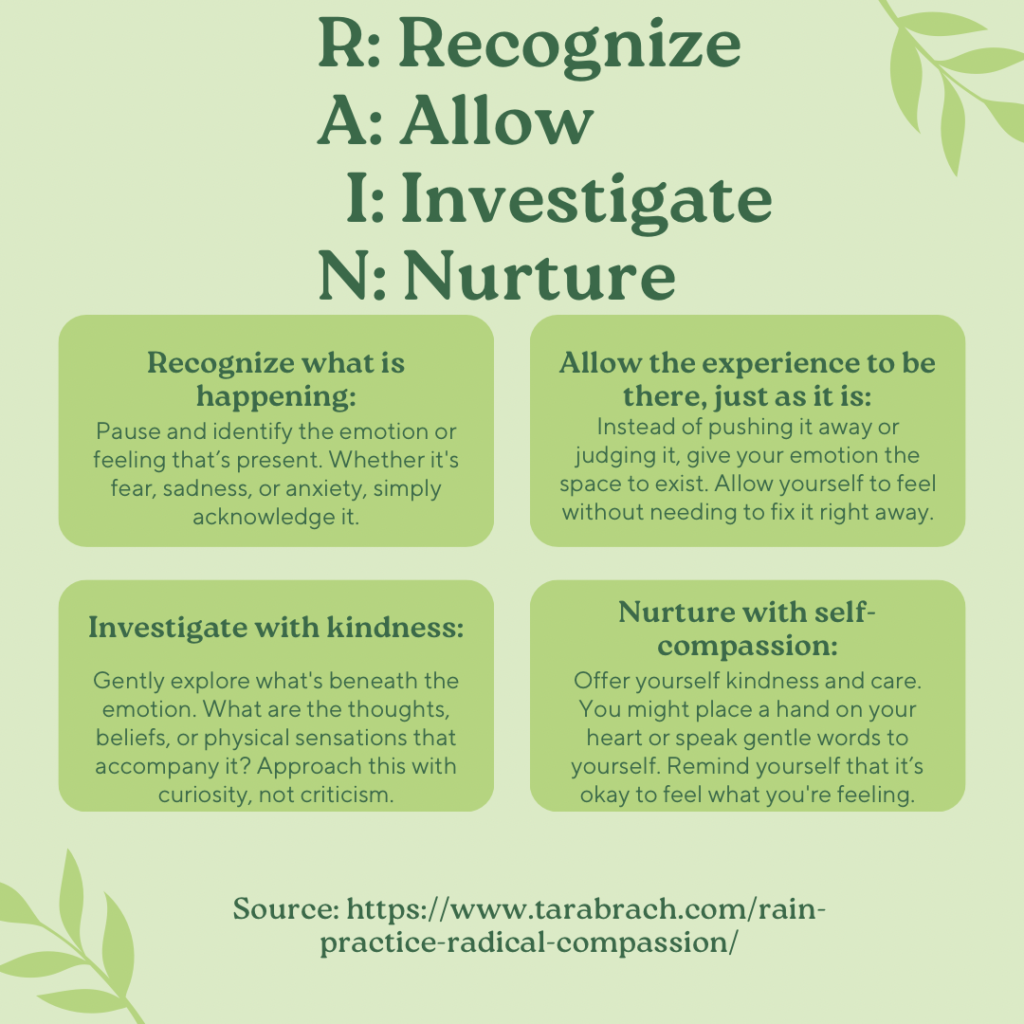I’ve been reflecting on the importance of accepting our feelings as they are, without judgment. When a challenging emotion like worry or sadness arises, how do you respond? How do you feel about feeling your feelings? What were you taught about expressing emotions as a child? In my practice, I have noticed that many people struggle with accepting their emotions, an important skill that many of us did not learn as children. We think if we allow space for sadness, worry, or anger, and accept them as they are, we give them the power to take control over our lives. So, we do whatever we can to keep them far away. However, what really ends up happening is that they find a way in regardless and become like unwelcome guests who never want to leave. You might think, “Hey, it’s time to stop feeling sad now, come on…” trying to hint to the sadness that it’s time to go, but emotions can be very demanding guests. They want to be heard, seen, felt, and cared for. Do they sound too needy? Well, they are.
I read a beautiful novel by the Japanese author Mizuki Tsujimura called “Lonely Castle in the Mirror.” The story is about a 13-year-old girl named Kokoro who stopped going to school because she was bullied by her peers. An incident happened where Kokoro felt helpless and ashamed. If I were to put myself in Kokoro’s shoes, my guess is that she believed she should have been able to stop the incident from happening, that it was her fault because she did “nothing.” I think the shame and humiliation prevented Kokoro from opening up to her mom about what happened. Maybe deep down, Kokoro believed she wasn’t worthy of being protected and cared for by her mother. That somehow, she was responsible for the bad thing that happened to her because she wasn’t strong enough, brave enough, or smart enough.

When we don’t allow ourselves to feel our emotions, they find a way to send us a message through our body, like tightness in the chest, dryness in the mouth, a lump in the throat, or a knot in the stomach. Take a moment to notice what is happening in your body now. Are any of these sensations familiar to you? Every morning, Kokoro experienced stomach pain that would prevent her from going to school, as if her stomach was telling her what she was unable to express out loud: “I am scared.” But Kokoro has no one to talk to about her fear, and that can be such a lonely experience. So, instead, it’s as if the fear gets locked up inside her stomach, reminding her of its need for attention and care. There’s a part of Kokoro that wants to reach out and tell her mother everything, to be held and cared for by her mother, but another part traps her inside the loneliness, making her believe she is not worthy of that kind of care. How many of us do this? We hide our pain from others, maybe because, like Kokoro, we think we’re unworthy of having our needs met, or maybe we don’t want to burden others with our story. We feel alone in our pain, which only leads to more suffering.
“True healing arises when we learn to be present with our pain without trying to change it or push it away. Acceptance of our emotions is the first step towards understanding and transformation.”
– Tara Brach
Many of us can also relate to Kokoro’s mother. She does not push Kokoro to go to school; she knows something is wrong but avoids asking direct questions about what happened to Kokoro. I wonder if the mother, like many of us, believes that talking about emotions would make things worse. That if she just ignores them, they will go away, and Kokoro will eventually get better and return to her “normal” self. Kokoro’s mother is also struggling with two parts: the part that wants to reach out and ask about what hurts, and another part that feels helpless and avoids facing what is there. I wonder if this is also an act of protection. How can we learn to be there with another person’s painful emotions when we ourselves don’t know how to care for our own?
According to Virginia Satir, part of having healthy self-esteem is accepting our feelings as part of us. Instead of focusing on what to do with emotions or how to get rid of them, we simply need to be polite hosts who open the door with an open heart and allow them in. Emotions need space and room to be expressed. When we are hurt, it’s okay to express sadness or even anger. When we try to be curious about our emotions, we discover they have a lot to say. Allow it. Put on your detective hat and investigate: try to understand the story behind the emotion and what it needs from you. When you do this, you may find that possibilities start to emerge—that maybe you no longer have to follow the same pattern of responding that you are used to. Maybe numbing the pain or denying its existence are not the only ways to cope. Maybe you start being more curious, more understanding, more compassionate towards yourself.
Emotions can sometimes feel like a very strong wave. I understand that it can be overwhelming and scary to feel them. But when we ride the wave instead of trying to swim against it, the emotions become less intense. If we do this enough times, our confidence starts to grow, and maybe even our self-esteem. Satir believed that accepting our feelings as part of us is integral to having positive and healthy self-esteem. When we feel our feelings without judgment, we are listening to the voice inside of us that is saying, “Something needs my attention.” This validation sounds like, “My emotions matter, my needs matter, I matter.” When we take the time to be curious about our emotions, when we put effort into trying to listen and understand what they need, we are also strengthening the relationship we have with ourselves.
If you are interested in learning how to accept your emotions with compassion, I highly recommend trying the RAIN exercise by Tara Brach: RAIN: A Practice of Radical Compassion:

May you feel the lightness and joy that comes from accepting your emotions.
May you nurture a compassionate and loving inner voice that supports you in times of hardship.